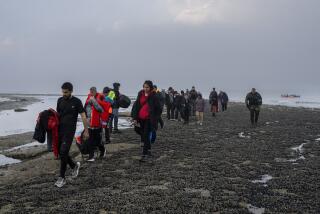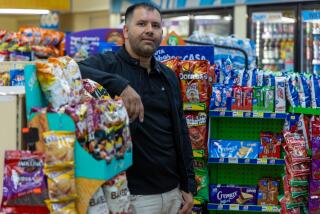Fargo Struggles to Make Home for Waves of Kurdish Refugees
- Share via
FARGO, N.D. — Bechud Mohammed thought he knew the extremes of cold weather.
He had lived in the hills of Kurdistan, where winds and occasional snow squalls can make a mountain man shiver. But at the end of his first day in Fargo, he was wide-eyed at the 8-foot-high ridges of slush that seemed to rise from every parking lot and sidewalk.
“When,” he asked, “does the sun come?”
Mohammed is one of the Kurdish refugees who have quietly settled in Fargo in the last six months, forced to emigrate here because of continuing tensions in their homeland in northern Iraq. They come with possessions packed in shopping bags and wearing the only clothes they own, scant protection against the arctic winter climate of North Dakota.
Fargo endured record flooding last week after a powerful April storm added 2 new feet to the record 109 inches of snow that buried this city of 80,000 all winter. Nonetheless, more Kurdish refugees were on their way here, lured by the prospect of jobs, low crime and a small but thriving population of relatives and friends.
Fargo has become an unlikely metropolitan magnet for the recent exodus of Kurdish refugees who were compelled to flee last summer after Iraqi troops made a brief incursion into Kurdistan and threatened anyone who had a connection to ousted international military observers and relief workers. Most of the refugees have scattered across America, often preferring sunnier cities like Nashville or San Diego. But at least 150 have clustered so far in Fargo, adding to one of the densest concentrations of Kurds in the nation.
Although Fargo’s new emigres have found ample aid from relief workers and the area’s tight-knit Kurdish community, the impact of their arrival--more than 60 have come in the last three weeks--has at times strained both the town’s ability to provide education and social services and its patience.
“This town was founded by immigrants, so I think most people here welcome newcomers. But assimilating such a large bulge of people in such a short time really puts stress on our ability to deliver service,” said Cass County Social Service Director Kathy Hogan.
From the moment they step off the night flight from Minneapolis after a long journey from Guam via Los Angeles, the refugees are shepherded by resettlement workers from the Lutheran Social Services-Episcopal Migration Ministries. In their first weeks here, they are given temporary housing, clothes, cash allowances and, when ready, job interviews.
“They’re coming here with, basically, nothing,” said Barry Nelson, who directs the resettlement effort that has been largely lauded by local officials for smoothly integrating Kurds and other refugees into Fargo life.
But Hogan and other officials worry about the months and years that will follow. Previous waves of Kurdish refugees--several hundred came in the 1970s and 300 settled in Fargo after the Persian Gulf War in 1991--have had difficulty maintaining a strife-free existence.
After the last wave of immigration in 1991, complaints by neighbors about what some said was excessive use of force in parental discipline led some teachers and counselors to call in Kurdish parents to explain that “there were other methods to use besides spanking,” said Verlene Dvoracek, who manages the Fargo school district’s English as a second language program. “We told them you could do things like take away their kids’ privileges, things like that. We’ll tell this new group early so it doesn’t become a problem.”
Social service workers were so overburdened by the needs of Gulf War emigres and other immigrants that in 1993 the county asked Nelson’s agency to put a temporary halt to new resettlement. The agency declined, citing humanitarian concerns. The latest wave of emigres from Kurdistan is again straining the county’s resources, Hogan said.
“The problem is they’re coming in such big population bulges,” she said. “We got a big wave last December and now another one in the last few weeks. What you have is a period of chaos, then it calms down, then chaos again. We have to scramble to find interpreters, and our people have to process all these families in one big rush. It’s not the way we should welcome people.”
Still, when nearly 16 new emigres crowded recently into a small apartment to watch grainy videotapes of a Kurdish wedding and dine on nan--Kurdish sesame bread--and okra soup, everyone insisted that they were in Fargo for the long haul.
“Better the ice and snow than [Iraqi leader] Saddam Hussein,” said Hameed Alemadi, the host, a Kurdish American who has worked as an interpreter on Guam and aided dozens of Kurds in resettling in Fargo.
Nearly 6,700 Kurds--freedom fighters, U.S. agency employees and workers for American- and European-funded relief groups--have come to the United States from Kurdistan since last summer, spirited out under an evacuation sponsored by American officials.
The evacuation started in September after Iraqi troops drove north over a border imposed on them after the Gulf War by U.S. troops. The Iraqis said they had been invited by one Kurdish political faction that had been feuding with another aligned with Iran. The Iraqi forces withdrew, but not before the United States and its allies pulled out their military observers and relief workers.
Despite the Iraqi withdrawal, “there was still enough concern about tensions there that we felt it prudent to bring out anyone who had an association with us,” said Hazel Reitz, a State Department spokeswoman.
The newly arrived refugees give a variety of reasons for their exodus. Some say they were compelled to leave by tirades in the Iraqi media against Kurds who were said to have collaborated with Americans. Some tell of rumors that Iraqi soldiers seized computerized lists of Kurds who had worked with American agencies. Others say simply that anyone with an American connection was in danger of being accused of spying.
“We were not political,” insisted Nori Ismaeil Fatah, 54, an art teacher who fled in December with his wife and two daughters. “But I worked as a logistics officer for a British group that was rebuilding homes. I was afraid that they [Iraqi troops] would come for us.”
The Fatahs sold their house and car to buy clothes and provisions for the trip out of Kurdistan. U.S. officials helped them get to Turkey, where they were airlifted to a military base on Guam. The refugees spent several months there, applying for asylum, undergoing medical tests and learning about life in America until they were approved for the flight to Los Angeles.
On Guam, Fatah at first was uncertain where he would go. He had no relatives here. But a chance meeting with Alemadi, who was working on Guam as a translator for American officials, persuaded him to come to Fargo.
“He told me there was no crime,” Fatah said. “In other cities, crime. And he said I could work. But it was the soldiers who told me how cold it would be here.”
Mohammed was also persuaded by Alemadi to bring his family to Fargo. The warehouseman who had worked for a British relief agency emigrated with his wife, Sheeren Abdula, and their 4-year-old son, Zhyare.
The night after they showed up in Fargo, toting a few bags, the Mohammeds joined Alemadi’s other guests for a welcoming dinner. As the others prepared to eat, young Zhyare recited the alphabet in English and danced in Alemadi’s living room while another refugee, Shawnet Rajab, plucked a plangent melody on a stringed tambor.
Gesturing to the lingering snow piles outside, Mohammed said he would soon buy his family warm coats. American stores, he said, “have everything.” That morning, Alemadi had taken him for a brief stroll through a local supermarket. Mohammed gawked at the aisles piled high with provisions.
“Ah, the goodness of America,” he said. “We will get what we need.”
More to Read
Sign up for Essential California
The most important California stories and recommendations in your inbox every morning.
You may occasionally receive promotional content from the Los Angeles Times.










